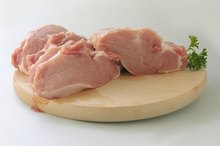What does fact checked mean?
At Healthfully, we strive to deliver objective content that is accurate and up-to-date. Our team periodically reviews articles in order to ensure content quality. The sources cited below consist of evidence from peer-reviewed journals, prominent medical organizations, academic associations, and government data.
The information contained on this site is for informational purposes only, and should not be used as a substitute for the advice of a professional health care provider. Please check with the appropriate physician regarding health questions and concerns. Although we strive to deliver accurate and up-to-date information, no guarantee to that effect is made.
What Is an Atherogenic Diet?
Every year over 715,000 Americans have a heart attack, and if you eat the typical Western diet you are at a greater risk for one, according to the Centers for Disease Control and Prevention 1. The Western diet is rich in cholesterol and other atherogenic factors. Atherogenesis is the formation of plaque in the inner lining of arteries and is associated with coronary heart disease, or CHD. CHD is a huge problem in the United States. Atherogenesis is an inflammatory response caused by a variety of risk factors, including high cholesterol, smoking, hypertension and high blood glucose levels.
Saturated Fat
Foods with saturated fat are extremely atherogenic. Most of these come from animal sources, but some plant foods have saturated fat. These include palm oil, palm kernel oil sometimes called “tropical” oil, coconut and coconut oil, and cocoa butter. The main animal sources are beef and beef fat, pork, veal, lamb, lard, poultry fat, milk, butter, cream, cheeses and other dairy whole milk and 2-percent milk products.
- Foods with saturated fat are extremely atherogenic.
- Most of these come from animal sources, but some plant foods have saturated fat.
Trans Fat
Diseases From Eating Unhealthy School Lunches
Learn More
Trans-fatty acids and hydrogenated fat in foods are atherogenic. Ideally trans fats should not make up more than 1 percent of your total daily calories. The main sources of these fats in the Western diet are cooking oils, margarine and shortening. Nutrition Facts labels on packaged foods list trans fat content.
- Trans-fatty acids and hydrogenated fat in foods are atherogenic.
- The main sources of these fats in the Western diet are cooking oils, margarine and shortening.
LDL Cholesterol
Trans fats and saturated fats are high in low-density lipoprotein, or LDL, cholesterol. LDL is the “bad” cholesterol. The top contributors to this cholesterol consumed from nonprocessed foods in the United States are beef and other red meats, egg yolks, organ meats, shellfish and poultry fat. For example, the average egg yolk has some 184 milligrams of cholesterol. About 3 ounces of beef liver has, on average, 309 milligrams of cholesterol, according to the USDA National Nutrient Database 34.
- Trans fats and saturated fats are high in low-density lipoprotein, or LDL, cholesterol.
- The top contributors to this cholesterol consumed from nonprocessed foods in the United States are beef and other red meats, egg yolks, organ meats, shellfish and poultry fat.
Fast Food and Processed Food
Components of a Triglyceride
Learn More
Fast foods, especially foods that are fried, are highly atherogenic. Commercial shortening and deep-frying fats are made by a process called hydrogenation, in which trans-fatty acids are formed. That means foods made with these shortenings and fats will contain saturated fat and trans fat. Processed food and baked foods are common in the Western diet. Doughnuts, cookies, cakes, crackers, french fries, muffins and pies are some examples.
- Fast foods, especially foods that are fried, are highly atherogenic.
- That means foods made with these shortenings and fats will contain saturated fat and trans fat.
Sodium
Excess sodium is one factor leading to hypertension, one of the inflammatory responses that contributes to atherogenesis. In the Western diet, people get up to to 75 percent of their sodium from processed foods, including soups, tomato sauce, condiments, canned foods and prepared mixes. Monosodium glutamate, or MSG, is a significant source of sodium in canned, packaged and frozen foods. It’s also found in restaurant cooking.
- Excess sodium is one factor leading to hypertension, one of the inflammatory responses that contributes to atherogenesis.
- In the Western diet, people get up to to 75 percent of their sodium from processed foods, including soups, tomato sauce, condiments, canned foods and prepared mixes.
Excess Sugar
Added sugars contribute to high blood glucose levels as well as cholesterol. Too much sugar is converted by the body to nonessential fatty acids and cholesterol. If you get more than 10 percent of your daily calories from added sugars, you have a greater risk of dying from heart disease, according to the February 2014 issue of the "Journal of the American Medical Association -- Internal Medicine. 5"
- Added sugars contribute to high blood glucose levels as well as cholesterol.
- If you get more than 10 percent of your daily calories from added sugars, you have a greater risk of dying from heart disease, according to the February 2014 issue of the "Journal of the American Medical Association -- Internal Medicine.
Related Articles
References
- Centers for Disease Control and Prevention: Heart Disease Facts
- Circulation: Markers of Inflammation and Cardiovascular Disease
- USDA National Nutrient Database: Egg Yolk, Raw, Fresh
- USDA National Nutrient Database: Liver, Beef, Pan-Fried
- Journal of the American Medical Association: Internal Medicine: Added Sugar Intake and Cardiovascular Diseases Mortality Among US Adults
- USDA. Dietary guidelines for Americans, 2015-2020, 8th edition.
Resources
Writer Bio
Linda Tarr Kent is a reporter and editor with more than 20 years experience at Gannett Company Inc., The McClatchy Company, Sound Publishing Inc., Mach Publishing, MomFit The Movement and other companies. Her area of expertise is health and fitness. She is a Bosu fitness and stand-up paddle surfing instructor. Kent holds a bachelor's degree in journalism from Washington State University.









